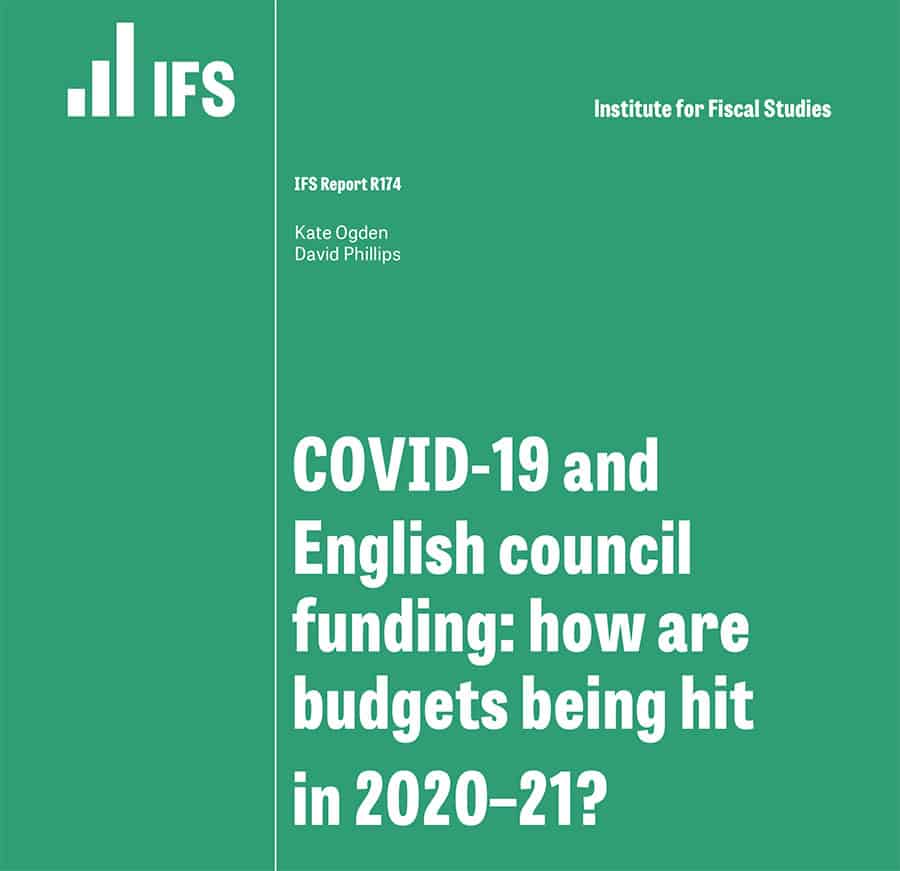Councils in England face funding shortfall of approx. £2bn in 2020-21, report suggests
A new report from the lnstitute for Fiscal Studies (IFS) has explored how the coronavirus pandemic has affected, and will continue to affect, councils’ budgets across England in 2020-21, and what the implications for future funding policy might be.
Entitled ‘COVID-19 and English council funding: how are budgets being hit in 2020–21?’, the report notes that councils in England have had to increase their spending while simultaneously reduce incomes as a result of the COVID-19 crisis. For instance, councils have had to spend more on personal protective equipment (PPE), while taking on additional responsibilities like helping with testing and tracing.
Furthermore, the IFS says that the wider economic effects of the coronavirus pandemic are hitting councils’ various income sources to different extents as households and businesses radically change their behaviour and struggle to pay tax bills, rents and service charges.
To explore these themes further, the report looks at: the scale and nature of forecast impacts on spending and income from sales, fees and charges (SFCs) and commercial and other sources; how impacts may vary across council types, regions and council characteristics; what financial resources councils have, either from central government or in the form of reserves; and the implications for future funding policy.
Whilst the report is designed to provide some insight into how councils’ budgets are being hit due to the pandemic, the IFS emphasises that forecast spending and income is difficult to predict due the current uncertainties.
“This means estimates are subject to potentially significant margins of error, which we can only partially address via robustness and sensitivity checks,” the institute explains.
Adult social care
According to report, councils predict spending pressures of £4.4 billion and non-tax income pressures of £2.8 billion, which equates to a financial hit of 13 percent of pre-crisis expenditure.
Councils remarked that adult social care accounts for £1.8 billion of these spending pressures. This, in part, could be down to more people living longer with more complex, long-term health conditions, meaning they might need costly housing adaptations to enable them to remain independent at home, for instance.
In March 2020, the Local Government Association (LGA) said that adult social care services face a funding gap of almost £4 billion by 2025, just to cover basic inflationary and demographic pressures.
These findings suggest that a long-term, sustainable solution is urgently needed to address the adult social care funding gap to ensure that councils can cope with the increasing demand and people can continue to receive the vital care they need.
Spending pressures
Furthermore, the report estimates that roughly 41 percent of the spending pressures (£1.8 billion) faced by councils and 45 percent of the income pressures (£1.3 billion) have taken place between April and June (Q1).
This implies that pressures are forecast to be less than half their Q1 levels in the remainder of the financial year. However, in light of the uncertainties surrounding the pandemic, these pressures may abate by more or less than councils have assumed, the IFS notes.
In addition, the report found a significant variation in forecast pressures across councils, especially for non-tax income. For example, just over three in ten councils expect non-tax income to fall by the equivalent of less than five percent of their pre-crisis expenditure, while almost one in six expect a reduction of 20 percent or more.
Shire districts, which are especially reliant on income from SFCs and commercial activities, are forecasting combined pressures averaging 23 percent of pre-crisis expenditure, compared with less than 15 percent, on average, for other council types, the findings uncovered.
Government funding
The UK Government has provided £4.8 billion of general and specific grant funding for councils to meet spending and non-tax income pressures this year, the report underlines.
On top of this, councils forecast savings of £27 million due to furloughing people as part of the Coronavirus Job Retention Scheme and £293 million of cost-sharing by the NHS. The IFS adds that it predicts councils could have around £1 billion of their losses in SFCs compensated by the ‘safety net’ scheme announced last month.
Funding shortfall
When considering the various income streams and pressures that councils across England are facing, the IFS predicts a funding shortfall of approximately £2 billion for 2020-21 for councils. Although, the institute stresses that this number could be much bigger or smaller, depending on the pressures heading out of Q1 and funding availability
For example, if pressures in the remainder of the year are two-thirds (as opposed to less than half) of those between April and June, the shortfall would be around £3.5 billion, the report notes.
Furthermore, if councils rely on their reserves to meet these unfunded pressures, the report suggests that this would lead to a drastic increase in the number of councils with low reserves relative to their pre-crisis expenditure.
“Councils in such a situation could face a tricky trade-off between making in-year cuts or making cuts in coming years to rebuild their reserves,” the IFS adds.
Recommendations
To address the issues outlined in the report, the IFS has made a number of suggestions that the UK Government consider to help reduce pressures on councils throughout England.
The institute says that simplest way would be to increase the general grant funding it gives councils, but notes that this would be a costly way to support the councils facing the biggest problems and that more targeted support would be more cost-effective.
“One option would be to follow the example of Wales, where councils submit claims based on the additional costs they have incurred, subject to some vetting,” the IFS recommends. “Temporary powers to borrow to cover day-to-day spending could also be considered, and have been identified by the OECD as a sensible way to give local areas more flexibility and autonomy to respond to the crisis as they see fit.”



